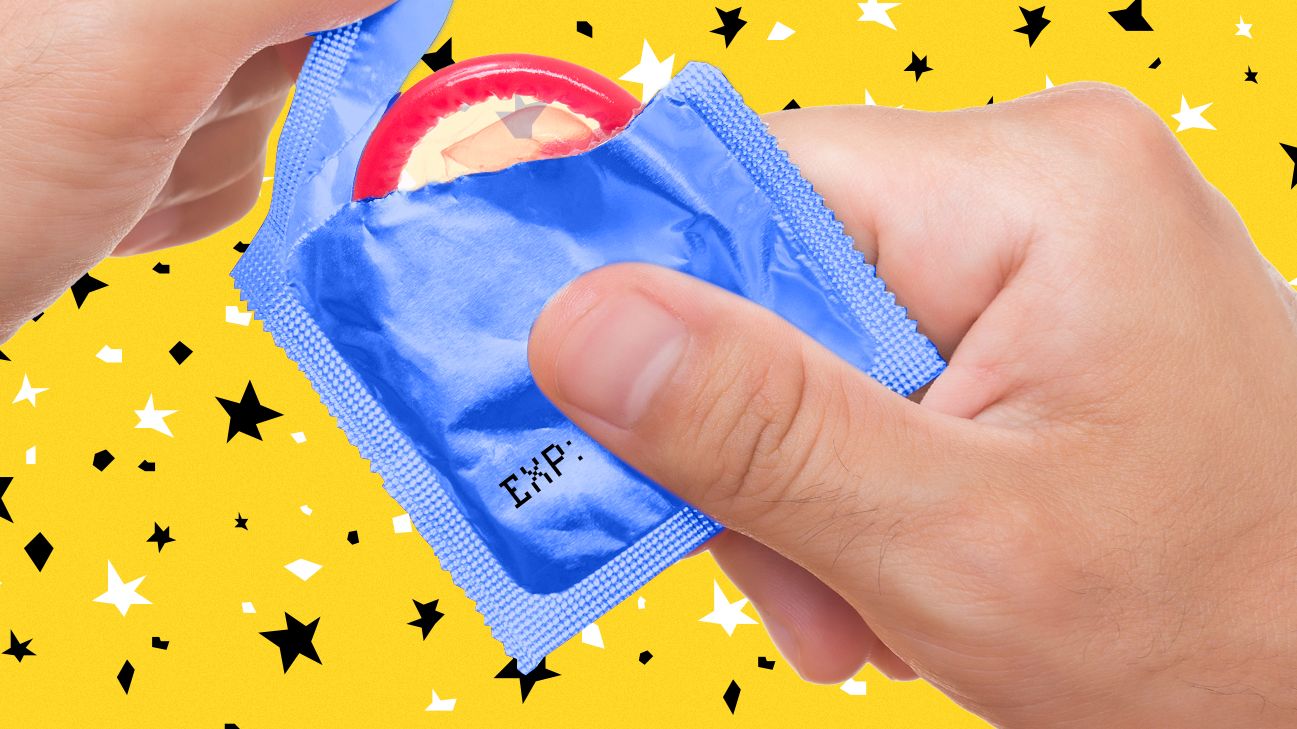Weenie beanie, happy hat, rubber johnny — a condom by any other name is still a great way to protect yourself against sexually transmitted infections (STIs) and unplanned pregnancies.
But what about condoms that go unused for longer than you planned? Can you still use a condom that’s been lurking in your wallet for the past year— or the last 3? We’re asking the hard questions to wrap up this topic.
Do condoms expire?
Yes, condoms can expire.
And an expired condom may be a less effective condom. Why’s that important? Using external condoms reduces the chance of pregnancy and contracting all sorts of STIs (like gonorrhea and HIV). So, always check the condom’s expiration date before, err, diving in.

Depending on how you store them, what they’re made of, and the brand’s quality, condoms can last a long time, but they don’t last forever. The average condom lasts around 3 to 5 years, but it can expire more quickly if you expose it to heat or sunlight. Lots of wear and tear in a wallet or purse can also shorten its lifespan.
The material makes a difference, too. Natural condoms made of lambskin tend to have a shorter expiration date, as they break down quicker than synthetic latex or polyurethane alternatives. Plus, anything added to synthetic johnnies like spermicide can reduce its useful life by as much as a couple of years.
The first sign that your trusty protection is expired is that the condom expiration date has passed. Look for a stamp with a string of numbers that could correspond to a future date. For example, if you see 05-2026, it means the condom expires in May of 2026.
You can usually get a good idea of the condom’s health just by looking at its packaging. If the wrapper is torn, faded, or leaking lube, then it’s likely past its prime. You can check the wrapper for holes by squeezing it lightly and feeling for air. There should be a cushion of air inside the package.
If the wrapper seems fine, but when you open the condom, it’s dry, stiff, and sticky, toss it. Don’t use a condom if it has any holes, tears, or funky smells.
Yes, you can use an expired condom. After all, who’s going to stop you? If you’ve stored it in a cool, dry place and it’s not years out of date, then it may be relatively safe.
That said, an expired condom is more likely to have teeny-weeny tears that aren’t that obvious. Also, your rubber friend could break more easily, meaning it may not provide the best protection against unintended pregnancy and STIs. So, yes, you can use it, but this could affect your health.
If your only option is to use an expired condom or have sex without a barrier method, then go with the expired condom. Even Planned Parenthood agrees.
You need to take care of your condoms if they’re going to take care of you. Knowing how to store condoms correctly helps avoid damage that can allow love fluids to escape — and you definitely don’t want that.
- Choose a moderate, dry place to store your condoms. Exposing condoms to heat above 104°F (40°C) can weaken latex.
- Avoid moving, bending, or squashing them. Yes, they can withstand vigorous activities while in use, but keep them out of harm’s way before it’s their time to shine.
- An accessible bedside drawer or box on the table nearby is a good choice for most people.
- If you want to keep condoms on your person, choose somewhere where they won’t be folded, bent, or damaged by opening and closing. An empty sunglasses case is a good option, as is a cardholder.
- Don’t keep a condom in your cell phone case, as it can get extremely hot and damage the latex.
Finding out your condom has expired could happen at a very inconvenient time. So, what are your options if you’re about to get down and your condom game isn’t looking strong?
Press pause on sexy time
The safest option is to hold off until you have an in-date condom. Rubbers are great at what they do, and if they haven’t expired and you use them correctly, they’re around 98 percent effective at protecting you against STIs. Even if you don’t use them perfectly, they’re still about 85 percent effective.
Use emergency contraception
If the heat of the moment is just too much, then you’re probably better off using the expired condom rather than nothing at all. Although ineffective against STIs, a penis owner can pull out before ejaculation to help protect against unintended pregnancy. (Just remember — this is only about 75 percent effective.) You can also use emergency contraception either immediately after sex or up to 3 days afterward. An emergency IUD is good up to 5 days after sex.
Get tested for STIs
If you’ve used an expired condom and are unaware of your partner’s STI status, then you should contact a sexual health clinic as soon as possible. You can get tested for infections and discuss post-exposure prophylaxis (PEP) against HIV if needed. You can also ask about human papillomavirus (HPV) and hepatitis B vaccinations to protect yourself in the future.
Condoms are essential in preventing STIs and unplanned pregnancies. However, they don’t last forever. Remember to check the expiration date before relying on a condom for protection.
To give them the longest life possible, store your condoms somewhere safe and away from extreme temperatures, sunlight, and sharp objects.

